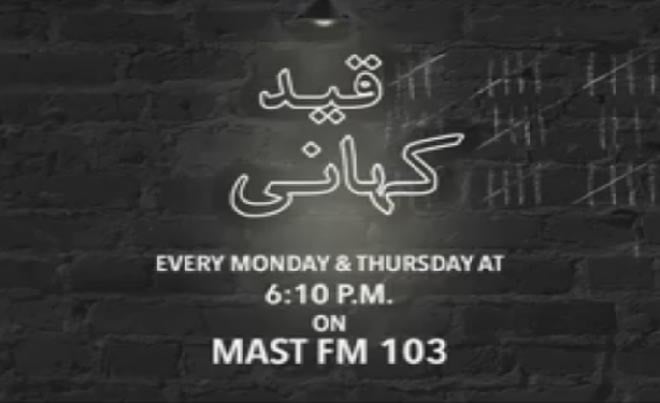
An effort to discuss the loopholes in Pakistani criminal justice system through narrating real life stories on radio

Story-telling is a corner stone of human interaction. Stories are a safeguard against memory loss -- preserving an essence of the experience for those unable to partake of it. For centuries, storytellers have enjoyed an important but contradictory role in the corridors of power. They have been praised; they have been mocked; and some have even been persecuted for relating incidences that reflected uncomfortable truths about their societies.
More than the written word, orally transmitted stories have saved countless cultures from extinction and preserved histories for humankind. Oral storytelling is an interactive and live art form, requiring an audience to engage with the story itself.
Justice Project Pakistan’s latest collaboration with Ajoka Theatre and Mast FM 103, Qaid Kahani, is one such effort to engage with the Pakistani society and start a social discussion about the loopholes in the Pakistani criminal justice system. Justice Project Pakistan (JPP) is a non-governmental organisation that has been championing the right of death row inmates to fair trials and legal aid in Pakistan.
The organisation has been spearheading a campaign called ‘Bring it back’ that advocates reinstating the moratorium on the death penalty in the country. Currently, Pakistan has the highest number of prisoners languishing on the death row in the world. What is a bigger cause for concern, is the fact that some prisoners have been wrongly accused, while others have been incarcerated for years without being given a fair trial.
Qaid Kahani is a radio series narrating fictionalised accounts of the stories of death row inmates in Pakistani jails. Aired during the month of May in the form of fifteen-minute-long episodes, the radio series was a novel concept of public advocacy. Each episode encapsulated the real life story of a particular death row prisoner. According to JPP, the narrations were an attempt to humanise those condemned to the death penalty and raise questions about the fairness of the justice delivery system.
The death penalty is a controversial topic in Pakistan and so is mental illness. Social taboos and denial regarding the presence of mental illnesses have meant that patients with mental health issues often do not get proper and timely treatment. Unfortunately, society’s reluctance to accept mental illness as a serious concern translated into the death penalty for Shaukat Ali, a patient of schizophrenia whose story was the focus of one episode of the radio series on Mast FM 103. A judge’s dismissal of his schizophrenia as insufficient grounds on which to absolve him from the death penalty is yet another case of social apathy towards mental illnesses.
The Qaid Kahani episodes highlight the faults within not just the legal system, but also the law enforcement system where petty criminals and innocent citizens are tortured daily to coerce confessions and wrap up unsolved cases.
Pakistan ratified the United Nations’ Convention Against Torture in 2008, yet cases of police torture recorded by NGOs number in hundreds. Torture, physical and mental, is taken as a standard procedure of dealing with prisoners in Pakistani jails and is an expected privilege exercised by jail authorities in ‘disciplining’ prisoners. The story of Parveen Bibi, who was tortured to the point of muteness, was the subject of another episode. Parveen has been on death row for the past twenty-six years, and repeated appeals to the higher courts for her exoneration have been dismissed. She was finally transferred to the Punjab Institute for Mental Health in 2006. She was removed from the world of torture, but after the loss of a wilful desire to speak.
Police brutality and negligence ran as a morbid undercurrent in the story of Muhammad Shafique as well, a juvenile who was wrongfully but deliberately booked by the relevant police authorities as the kidnapper and murderer of a child. His story raises questions not just about the legal aspects of condemning a juvenile to the death row in Pakistan, but also about a troubling lack of humanitarianism that allows such convictions to pass without inquiry.
The radio series aired eight stories. Thousands more remain untold. Hundreds of death row inmates live in constant fear of the gallows, unsure when their turn will come yet resigned to the reality that the criminal justice system has turned a blind eye to their plight. Most of those condemned to this irreversible penalty cannot afford to line interrogators’ pockets with money and beg for a chance at a fair trial. Some are condemned irrespective of evidence about their mental illness, or physical disabilities, as in the case of Abdul Qadir, a paralysed death row prisoner.
Qaid Kahani was a brilliant usage of radio time. As a medium of entertainment and information, radio has a much broader reach in Pakistan. It is also free of the distractions that accompany visual mediums like television that would have detracted from the somber reality of the issue at hand. Narrating the stories in Urdu was another plus point that ensured the largest possible audience understood the stories. FM 103 is a popular radio channel, and their collaboration with JPP and Ajoka bodes well for the use of mainstream media as a platform for social change. The stories were narrated in a simple manner-devoid of melodrama so the real life accounts could take centre-stage.
The radio series can be accessed and heard via Justice Project Pakistan’s Facebook page